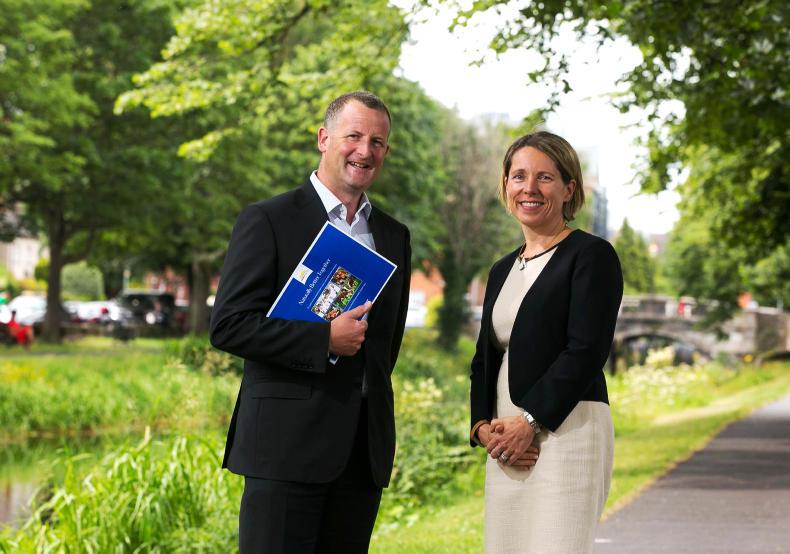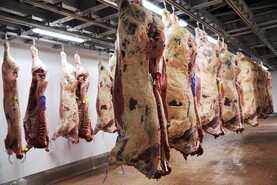Dawn worried about slavery and transparency
The Dealer was leafing through Dawn Meats’ 86-page Group Corporate Social Responsibility Report 2019 when my attention was piqued by its 'sustainable sourcing' section.
In it, the company declared a commitment to “tackling modern slavery within their supply chains” and indeed a willingness on the part of themselves and UK partners Dunbia to “invite and undergo regular third-party ethical audits, where our approach and effectiveness in tackling modern slavery is assessed as part of the process”.
Dawn also highlights that “responsible companies invite external oversight and verification in order to provide assurance to its stakeholders”.
The Dealer is wondering when Dawn will allow external oversight into its financial performance to see how much more money could be redirected towards farmer suppliers and lift them out of the economic crisis they feel trapped in with current beef prices.
Former Department man appointed to FAI board
The Dealer hears that a former assistant general secretary at the Department of Agriculture has been appointed to the board of the Football Association of Ireland (FAI).
Martin Heraghty retired in 2013 after holding a range of positions in the Department, including head of corporate affairs.
He was also centrally involved in the management of the foot-and-mouth disease outbreak, the dioxin crisis and the horsemeat incident.
Heraghty was previously on the board of directors of Teagasc and is the Sligo Rovers chair.
He was elected on to a 12-person interim board at the FAI’s AGM as a League of Ireland representative.
Fake grass in new pitches at the Aviva and Páirc Uí Chaoimh
The Aviva Stadium and Páirc Uí Chaoimh in Cork have installed 5% fake grass on their new pitches.
The first new pitch in six years at the Aviva was installed just in time for the Ireland v Italy game on Saturday 10 August.
Down in the Rebel County, work on the pitch at Páirc Uí Chaoimh is to begin in September and be ready for the 2020 Allianz Leagues.
Both pitches are made from SISGrass, which I’m told is 95% natural grass, with synthetic fibres inserted into the turf.
Apparently that helps to extend the playing hours and improve pitch recovery.
Change at Ornua as growth on agenda
I see that Anne Randles has stepped down as secretary of Ornua and has been appointed to a newly created role of director of corporate affairs.
John McRedmond has been appointed company secretary, alongside his current role of general counsel.
I also noted that Ornua is recruiting for another newly created position, that of chief growth officer, with a job description that puts mergers, acquisitions and new business development under the role.
It is interesting to see the new positions being put in place at the same time as Ornua’s board is examining plans to restructure the co-op into an unlisted plc.
Former Top Gear presenter Clarkson turns shepherd
I see former Top Gear presenter Jeremy Clarkson has purchased his first flock of sheep while attending Thame Showground in England this week.
Living on a 400ac tillage farm in Oxfordshire, Clarkson has decided to turn his hand to shepherding.
A batch of 78 shearlings were purchased on the day.
I Bought a Farm is a new show the 59-year-old presenter will feature in, aiming to display his new-found passion for farming.
On screens next year, I hope Clarkson shows more caring towards his new flock than he allegedly did to his former producers.
A political animal, in the form of An Taoiseach Leo Varadkar, turned heads in the Nenagh Show ring on bank holiday Monday.
He was all smiles posing for pictures with farmers and pinning rosettes to pretty Hereford heifers.
But when The Dealer asked for a comment on the recent climate report which advocated a cut to the suckler herd, I was told “no”.
I tried my luck a second time and asked for a comment on how An Taoiseach was enjoying the show. Another “no”.
While protests might be slowing down cattle throughput, Larry Goodman’s ABP group is still going full steam ahead inside the factory gates, hiring meat boners.
The job announcement was made in tandem with the release of 300 work permits specifically for meat boners from non-EU countries.
But it might give some farmers food for thought, given the salary of €27,500 per annum is an awful lot more than the average suckler farmer makes.
Dawn worried about slavery and transparency
The Dealer was leafing through Dawn Meats’ 86-page Group Corporate Social Responsibility Report 2019 when my attention was piqued by its 'sustainable sourcing' section.
In it, the company declared a commitment to “tackling modern slavery within their supply chains” and indeed a willingness on the part of themselves and UK partners Dunbia to “invite and undergo regular third-party ethical audits, where our approach and effectiveness in tackling modern slavery is assessed as part of the process”.
Dawn also highlights that “responsible companies invite external oversight and verification in order to provide assurance to its stakeholders”.
The Dealer is wondering when Dawn will allow external oversight into its financial performance to see how much more money could be redirected towards farmer suppliers and lift them out of the economic crisis they feel trapped in with current beef prices.
Former Department man appointed to FAI board
The Dealer hears that a former assistant general secretary at the Department of Agriculture has been appointed to the board of the Football Association of Ireland (FAI).
Martin Heraghty retired in 2013 after holding a range of positions in the Department, including head of corporate affairs.
He was also centrally involved in the management of the foot-and-mouth disease outbreak, the dioxin crisis and the horsemeat incident.
Heraghty was previously on the board of directors of Teagasc and is the Sligo Rovers chair.
He was elected on to a 12-person interim board at the FAI’s AGM as a League of Ireland representative.
Fake grass in new pitches at the Aviva and Páirc Uí Chaoimh
The Aviva Stadium and Páirc Uí Chaoimh in Cork have installed 5% fake grass on their new pitches.
The first new pitch in six years at the Aviva was installed just in time for the Ireland v Italy game on Saturday 10 August.
Down in the Rebel County, work on the pitch at Páirc Uí Chaoimh is to begin in September and be ready for the 2020 Allianz Leagues.
Both pitches are made from SISGrass, which I’m told is 95% natural grass, with synthetic fibres inserted into the turf.
Apparently that helps to extend the playing hours and improve pitch recovery.
Change at Ornua as growth on agenda
I see that Anne Randles has stepped down as secretary of Ornua and has been appointed to a newly created role of director of corporate affairs.
John McRedmond has been appointed company secretary, alongside his current role of general counsel.
I also noted that Ornua is recruiting for another newly created position, that of chief growth officer, with a job description that puts mergers, acquisitions and new business development under the role.
It is interesting to see the new positions being put in place at the same time as Ornua’s board is examining plans to restructure the co-op into an unlisted plc.
Former Top Gear presenter Clarkson turns shepherd
I see former Top Gear presenter Jeremy Clarkson has purchased his first flock of sheep while attending Thame Showground in England this week.
Living on a 400ac tillage farm in Oxfordshire, Clarkson has decided to turn his hand to shepherding.
A batch of 78 shearlings were purchased on the day.
I Bought a Farm is a new show the 59-year-old presenter will feature in, aiming to display his new-found passion for farming.
On screens next year, I hope Clarkson shows more caring towards his new flock than he allegedly did to his former producers.
A political animal, in the form of An Taoiseach Leo Varadkar, turned heads in the Nenagh Show ring on bank holiday Monday.
He was all smiles posing for pictures with farmers and pinning rosettes to pretty Hereford heifers.
But when The Dealer asked for a comment on the recent climate report which advocated a cut to the suckler herd, I was told “no”.
I tried my luck a second time and asked for a comment on how An Taoiseach was enjoying the show. Another “no”.
While protests might be slowing down cattle throughput, Larry Goodman’s ABP group is still going full steam ahead inside the factory gates, hiring meat boners.
The job announcement was made in tandem with the release of 300 work permits specifically for meat boners from non-EU countries.
But it might give some farmers food for thought, given the salary of €27,500 per annum is an awful lot more than the average suckler farmer makes.






 This is a subscriber-only article
This is a subscriber-only article










SHARING OPTIONS: